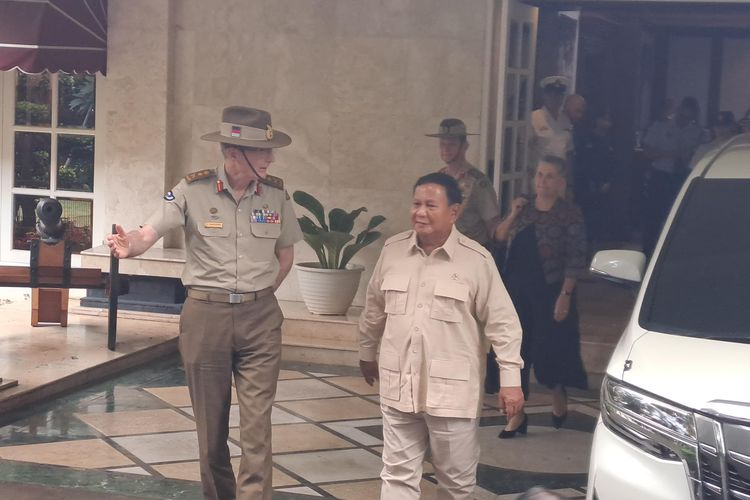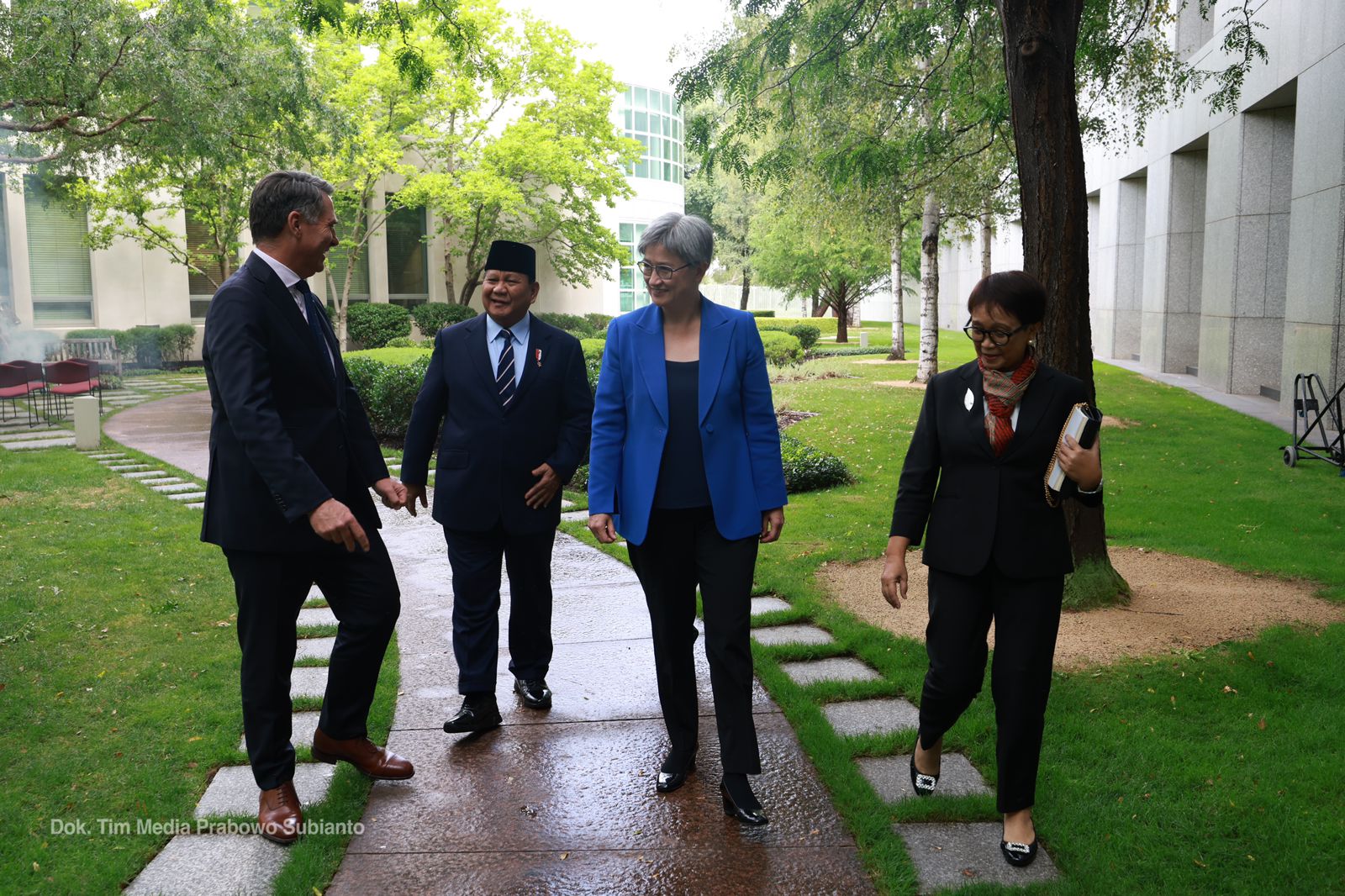ALLOW US TO INGRATIATE
All is forgiven - who cares about the past? Jokowi reinstates Prabowo
There’s a seething and brutal guerrilla war underway in the Indonesian provinces closest to Australia. Thousands have been killed but little is known because foreign journalists and UN inspectors are banned.
At first it was arrows against AK-47s, but the independence-seeking rebels are now better armed and more lethal.
A just-concluded security deal with Jakarta gives Canberra a chance to offer mediation, let observers in and help secure the human rights we uphold in other conflicts.
Though not this one. Instead we get closer to an antagonist, ignore the abuses and agree to be gagged under the Agreement Between Australia and the Republic of Indonesia on the Framework for Security Cooperation.
The deal was ticked while Indonesian Defence Minister and President-elect Prabowo Subianto was briefly Down Under. Defence Minister Richard Marles is reportedly heading to Jakarta soon for the big final inking.
Australians keen to understand what international handshakes are happening in their name might want to know who we’re dealing with and scrutinise the language.
An ‘agreement’ may be a synonym for a ‘pact’, ‘alliance’ or ‘arrangement’ in casual talk, but it’s not a formal ‘treaty’, whatever Anthony Albanese suggested in a joint media statement on Tuesday. (20 Aug).
Treaties around the world are big time, the most notable being the North Atlantic Treaty Organisation, a military alliance of 32 states founded in 1949. Members agree to defend each other against attacks by third parties.
The ANZUS Treaty with the US has been our supposed defence bedrock since 1952.
Staged bonhomie is essential in diplomacy - and collaboration better than confrontation. Unfortunately in our dealings with Indonesia straight talk is the casualty.
The PM's office calling Prabowo 'HE General (rtd)' may be polite but untrue. The career soldier was cashiered in 1998 for disobeying orders, then fled into exile in Jordan for seven years.
Men under his control were allegedly involved in the disappearance of activist students. Their families have staged Aksi Kamisan (Thursday action) demonstrations outside the Presidential palace in Jakarta every week since 2007 wanting to know what happened to their sons.
Prabowo's record as a commander in East Timor last century is allegedly grim.
Australian researcher Pat Walsh, who was involved in the new nation's Reconciliation Commission (CAVR) has called Prabowo ”a person with demonstrated disregard for the rule of law, of both the domestic and international kind, and regarded by many as a war criminal.”
Prabowo denies wrongdoing and has never been charged in court. He becomes president in October having decisively won (58 per cent) of the February election.
Understandably, Australian ministers dealing with the world's fourth-largest nation with a population eleven times bigger prefer to dodge historical facts and sell out upholders of human rights.
Before the Tuesday announcement Daniela Gavshon, the local director at Human Rights Watch wrote that Australian government leaders should “raise concerns about the deteriorating human rights situation in the Indonesian provinces of West Papua”.
She alleged “ongoing abuses against indigenous Papuans include killings, enforced disappearances, torture, and mass displacement of people.”
According to four Australian academics including a former AFP investigator, "hundreds of thousands" have died since 1965 when Indonesia took over the territory.
There's no indication HR issues have ever been discussed during the negotiations. Though the final text hasn't been released The Australian gave the show a page one paean, imagined multiple benefits, hinted China was a common threat and praised all participants.
Prabowo would be delighted getting homeland-style treatment in a nation with a media reputation for tough reporting.
It's understood one article in the agreement bans Australian support, participation or encouragement in activities "including separatism".
There's no mention of West Papua but this is what the words are about - effectively gagging any Australian government from voicing distress and lobbying for resolution.
Far from being outraged Minister Marles has embraced the ban. In February in Jakarta, he said:
“There’s no support for any independence movements … we support the territorial sovereignty of Indonesia and that includes those provinces being part of Indonesia, no ifs, no buts, and I want to be clear about that.”
This week’s announcement dubbed by the ABC as an "upgraded defence agreement", hardly seems worth bedecking the halls. Yet the PM called it "the deepest, the most significant agreement that our two countries have ever made."
Marles likes the adverb ‘profoundly’ using it twice to describe the dealings.
The Australians' glee was not reflected in Prabowo's comments or demeanour. The best he could manage was to call the deal a “good neighbour relationship.”
Instead, he spoke about the Olympics and illegal drugs, notably hosing down his host's ardour and extinguishing any hints of policy change:
"As you know we are, by tradition, non-aligned. By tradition, our people do not want us to be involved in any geopolitical or military alliances or groupings. I myself am determined to continue this policy."
While Albanese and Marles used ‘security’ to spruik the agreement as a defence deal, Prabowo only spoke of ‘food security’. No ’treaty’ on his lips, only Albanese’s:
“This historic treaty will bolster our strong defence cooperation by deepening dialogue, strengthening interoperability and enhancing practical arrangements.”
Using the term suggests that the local deal comes within Coo-ee of NATO or ANZUS. That’s ridiculous. There's no suggestion we'll dash into the archipelago to help should anyone invade, or the other way around.
So what’s going to happen? The PM again: “It will be a vital plank for our two countries to support each other's security, which is vital to both countries, but also to the stability of the region that we share.”
The best interpretation is that the Australian military will continue joint exercises with its Indonesian counterpart (the TNI) currently busy in West Papua.
Indonesian HRW researcher Andreas Harsono told Michael West Media that any bilateral agreement should include defending the rights of all people:
“I guess Indonesian officers will not be happy if Australian soldiers, involved in atrocities in Afghanistan are to take part in a military training program in Jakarta.
“Vice versa. Australian officers might not feel comfortable to train with abusive Indonesian soldiers who tortured indigenous Papuans.”
It hasn’t all been one-sided: This month guerrillas allegedly killed Kiwi chopper pilot Glen Conning; he was flying for an Indonesian company ferrying local health workers into a remote region. The six passengers were reportedly unharmed.
Another NZ pilot Phillip Mehrtens was seized early last year by the West Papua National Liberation Army. He's reportedly alive and being held hostage. The rebel group denies murdering Conning and has hinted at military involvement.
The PM said the agreement will “see us working together in the global commons to support the rules-based order and, importantly, it will allow us to operate from each other's countries."
Though not West Papua.
First published in Michael West Media, 22 August 2024: https://michaelwest.com.au/when-is-a-treaty-not-a-treaty-the-marles-and-prabowo-canberra-love-in/
##







